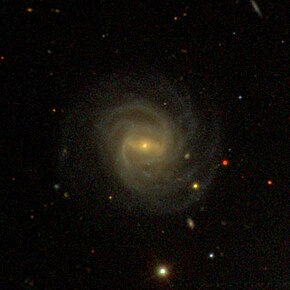NGC 47
 From Wikipedia the free encyclopedia
From Wikipedia the free encyclopedia
| NGC 47 | |
|---|---|
 SDSS image of NGC 47 | |
| Observation data (J2000 epoch) | |
| Constellation | Cetus |
| Right ascension | 00h 14m 30.6s[1] |
| Declination | −07° 10′ 03″[1] |
| Redshift | 0.019013[1] |
| Heliocentric radial velocity | 5700 ± 3 km/s[1] |
| Distance | ~236 Mly (redshift) |
| Apparent magnitude (V) | 13.5[1] |
| Characteristics | |
| Type | SB(rs)bc[1] |
| Apparent size (V) | 2.2′ × 2.1′[1] |
| Notable features | none |
| Other designations | |
| NGC 58,[1] PGC 967,[1] MCG 1-1-55,[1] IRAS 00119-0726[1] | |
NGC 47 (also known as NGC 58, MCG -1-1-55, IRAS00119-0726 and PGC 967) is a barred spiral galaxy in the constellation Cetus, discovered in 1886 by Ernst Wilhelm Leberecht Tempel. Its alternate name NGC 58 is due to the observation by Lewis Swift, who was unaware that Tempel had already discovered the celestial object earlier. It appears as a small, faint spiral nebula with a bright core and is slightly oval.
It is approximately 236 Mly (236 million light years) from Earth, measured by way of a generic "redshift estimate".[1]
References
[edit]External links
[edit] Media related to NGC 47 at Wikimedia Commons
Media related to NGC 47 at Wikimedia Commons- SEDS: Spiral Galaxy NGC 47
- NGC 47 on WikiSky: DSS2, SDSS, GALEX, IRAS, Hydrogen α, X-Ray, Astrophoto, Sky Map, Articles and images